It’s hard to argue that the fantasy genre doesn’t have a tendency to support the idea that the further a creature strays from the human ideal of beauty, the more likely said creature is to bite off your finger to steal your magic ring.
But there are those fantasy novels that flip the script, putting traditionally monstrous races in the role of the protagonist. In these books, the trolls and goblins and dragons get to be, er, people—and even if they sometimes still wind up working the teensiest bit on the side of the baddies, at least we can sympathize with their motivations.
Here are six books that explore the inner lives of members of the genre’s rogues gallery.
Cold Counsel by Chris Sharp
In this epic fantasy tale that delves into troll culture (of the non-4chan variety), the protagonist of Chris Sharp’s action-packed novel hews far closer to the familiar archetype of the brutal and brutish—but the world Slud Blood Claw inhabits is so harsh, and populated by so many other violent and power-hungry elves, witches, and goblins, it’s hard to fault him much for it.
Slud is the son of a powerful troll chief, and the portentous circumstances of his birth inspired in his dear old dad the belief that the trolls’ time to rule had come once again. The Blood Claw clan set off from their mountain stronghold to unleash hell on the surrounding kingdoms, but were quickly beaten back and systematically slaughtered by the vicious elves, leaving only Slud and his aged aunt and savior Agnes alive. Agnes trains him to be an unrepentant tool of the trolls’ revenge, and Slud takes well to her teachings. After Agnes is murdered by goblins, he emerges from hiding, axe in hand, and sets off to remind the world why trolls should be feared. Relentless and exacting, Slud isn’t exactly the sort of hero you fall for, but witnessing his grim journey from the inside offers fascinating, visceral insight into what it might be like to be raised in such an unforgiving, post-Ragnarok hellscape… (Spoiler alert: it’s not great.)
Buy the Book
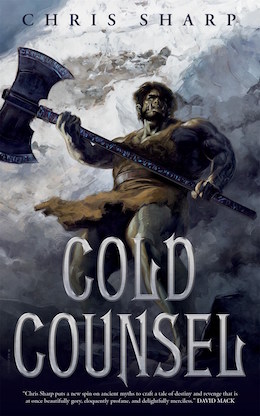

Cold Counsel
Grunts! by Mary Gentle
Mary Gentle isn’t exactly going for subtle with her sharp and satirical 1992 fantasy. The book takes a double-barreled shotgun to the notion that the human-looking races (men, elves, and halfings among them) are any better than the teeming masses under a dark lord’s command. The story follows an inconsequential group of orcs who are part of a massive army waging war against the so-called forces of good. The orcs turn out to be more or less as relatable as humans in their concerns—mainly, they don’t want to die—and the humans and elves no less corrupt than the baddest of the baddies (amusingly, the hobbit stand-ins are perhaps the nastiest characters in the novel).
It’s a deeply weird novel. The title refers not just to the manner of speech we might expect from piggish orcs: early in the book, the troop stumbles across a trove of military weaponry from the Vietnam era of our own world. The cache has been enchanted so that once the orcs touch it, they fall under a spell that sees them taking on the characteristics of the sort of stereotypical group of American soldiers we might meet traipsing through the jungle in a B-grade war flick. If Grunts! doesn’t make us sympathize with the orcs, exactly, it at least shows us that the line between heroes and villains is a lot thinner than we’d like to pretend it is.
Buy the Book
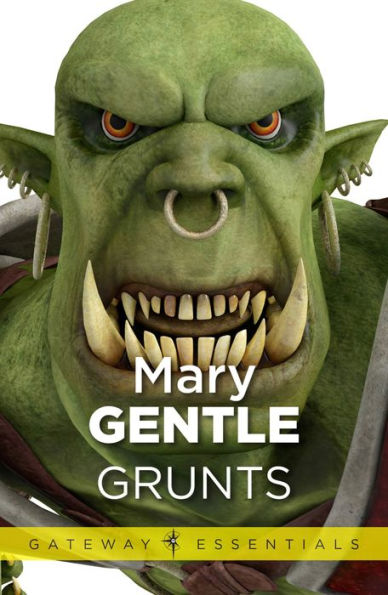

Grunts!
Spiderlight by Adrian Tchaikovsky
Arthur C. Clarke Award-winner Adrian Tchaikovsky has made a cottage industry of books with non-human protagonists, particularly with the super-intelligent spiders and cephalopods of his sci-fi novels Children of Time and Children of Ruin, respectively. But my favorite example of him giving the spotlight to a crawly creature comes in his D&D-flavored fantasy novella Spiderlight, equally a sincere heroes-on-a-quest story and a sendup of the familiar tropes and character types that have fueled so many late-night gaming sessions. The book follows a band of bog-standard adventurers (on paper anyway) as they try to unseat an all-powerful dark lord. They’re all here—rogue, warrior, magician, cleric—but each of them is notably flawed, from the cleric who doubts her faith to the magician too dim or impatient to master a spell more complex than “make fire, lots of it.”
Among this bunch is our inhuman charge, Enth, a giant spider turned into a human by magic (ok, once in a while the magician’s spells are ok) and commanded by the Spider Mother to help the rest of the crew on their mission. Enth, who is given his own point-of-view sections, quickly becomes the most fascinating character in the book because Tchaikovsky deals realistically (you know, relatively speaking) with his circumstances: not unsurprisingly, as he finds himself minus four of his limbs, he’s generally horrified. Enth’s transformation serves to highlight the divide between species, and greatly adds to the story’s subversive flair.
Buy the Book
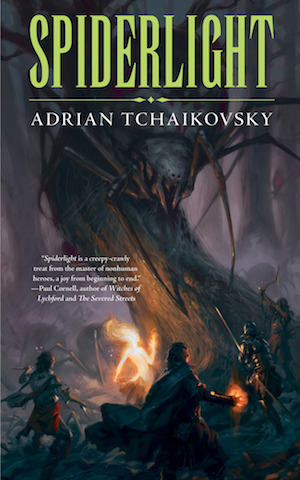

Spiderlight
Tooth and Claw by Jo Walton
Though the most famous dragons tend to be the hoarding and pillaging types, fantasy is filled with dragons of a friendlier sort; from Eragon’s Saphira to the many, many dragons of Pern, the winged beasts often prove both faithful companions and a deeply cool means of conveyance (I like to think of them as fantasy’s answer to sentient starships). But a few popular young adult fantasy series notwithstanding, dragons don’t often get to be the main character, typically playing sidekick to their riders.
Which is why I so love Tooth and Claw, Jo Walton’s irresistible, World Fantasy Award-winning twist on Victorian novel of manners. It’s a drama of family intrigue, societal manners, and magic, set in a world populated entirely by dragons in which humans don’t factor at all. Rather than simply recast an old-timey novel with dragons, Walton works at the problem from the other way around. The plot operates by all the stuffy strictures that were the hallmarks of Victorian society, from the intricacies of inheritance law to the proper behavior expected of a lady, but grounds them in the facts of dragon physiology. Wills are a big deal, because whichever offspring gets to consume the flesh of a dead draconic patriarch stands to grow in social standing, quite literally (dragon flesh being magical and all), while female dragons must be kept away from males as romantic contact might cause their scales to shift from gold to pink, signaling the end of their maidenhood, and therefore their suitability for marriage.
It’s a lot to chew on, but the author makes it go down easy; the plot hinges on the plight of three sisters looking to secure a position, a sensational court case, and a clash of religious ideals, and it’s peppered with endearing characters and winking humor—including countless loving descriptions of the dragons’ sartorial preferences, including ornate hats (a visual that will never cease to delight me).
Buy the Book
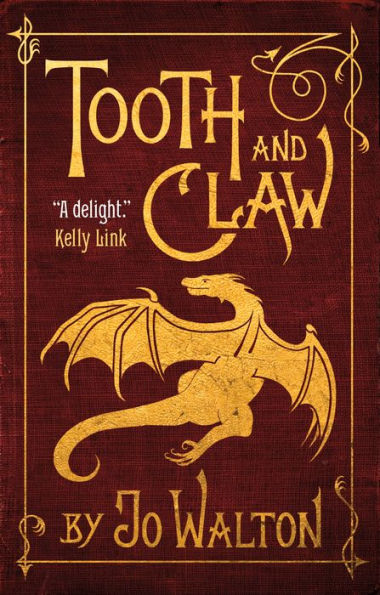

Tooth and Claw
Unnatural Magic by C.M. Waggoner
If orcs are frequently cast as faceless hordes of expendable warriors, trolls are just as often stuck in the role of immovable object: big, muscular, and dumb. It seems there’s always a troll around when a band of dungeon-traversing heroes gets a bit too cocky (or crosses the wrong bridge). But like A.K. Larkwood’s orcs (see below), the trolls of Waggoner’s delightful 2019 debut novel have a lot more going on upstairs. The novel is divided between two main characters: upstart human magician-in-training Onna is the the most promising magic user in her wizarding school, but no one takes her seriously because she’s lowborn and, more egregiously, a girl. Onna’s pushback against secondary world misogyny is thrilling—when the most elite school won’t take her, she sets off on a quest to prove her mettle—but I found myself drawn more to the other protagonist, Tsira, who has left the safety of her troll clan behind on a mission of self-discovery.
Interestingly, in this world, trolls sit atop the social order, with humans just underneath; the best magical schools are open only to trolls, and half-troll humans are exalted rather than shunned. It’s a fascinating backdrop for what turns out to be a compelling murder mystery: bands of trolls seem to have lost their minds and begun senselessly murdering humans in rural areas, while in that capital city, a number of trolls are showing up murdered. Working from opposite ends, Onna and Tsira (with a human companion in tow—an injured soldier she nurses back to health) attempt to solve the interconnected mysteries while unpacking their respective personal baggage.
Buy the Book
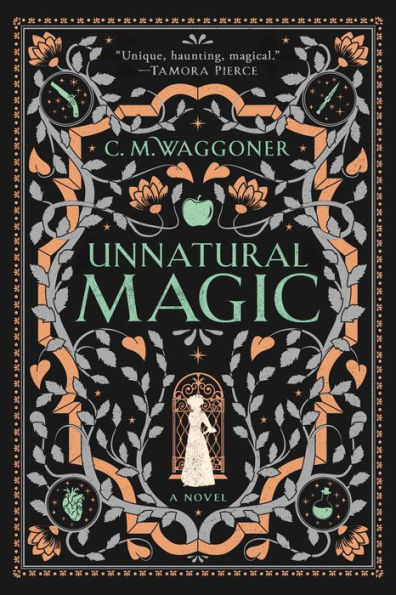

Unnatural Magic
The Unspoken Name by A.K. Larkwood
This buzzy, series-starting epic from debut author Larkwood has received impressive blurbs from a murderers’ row of my favorite fantasy authors, all of whom praise it for its originality (“…takes all the tropes of fantasy… and spins them into something wild and new,” says Hugo-winner Alix E. Harrow), its lovely prose, and especially for its unforgettable main character, young orc Csorwe, who was born and bred to be a sacrifice to a god but discovers a greater destiny instead (“Csorwe might have the tusks of an orc, but she is human to her core,” says author Kersten Hall).
The novel takes place in a world populated by familiar fantasy races, from elves to orcs—though they are never named as such. Csorwe certainly qualifies as the most well-developed orc (if the tusks are anything to go by) that I’ve ever encountered. The fate that awaits her after she is rescued from her deity’s jaws by a sly wizard bent on revenge against those who wronged him isn’t much less dangerous: to repay his act, she trains to serve as his assassin, hardening herself to the business of killing and suffering terrible torments as she carries out his missions. But the story is far from grimdark—reading it is a joy, as much for its creative flourishes (airships, giant talking snakes, and inter-dimensional portals, oh my) and irresistible dungeon-crawling atmosphere (fans of Gideon the Ninth, take note) as for Csorwe herself: clever, selfless, and queer, somehow gentle and unsure of herself even as she is forged by circumstance into a dangerous warrior. I’m excited to follow her into her next adventure.
Buy the Book
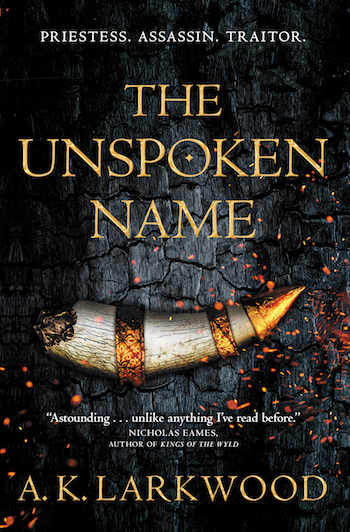

The Unspoken Name
Joel Cunningham was the founding editor of the B&N Sci-Fi & Fantasy Blog (RIP), where he got to explore the galaxy for 5 years and picked up a Hugo Award (well, tangentially) along the way. He lives in New York City with his wife and two children, despite the fact that this is a thing no sane person would choose to do. He tweets @joelevard.










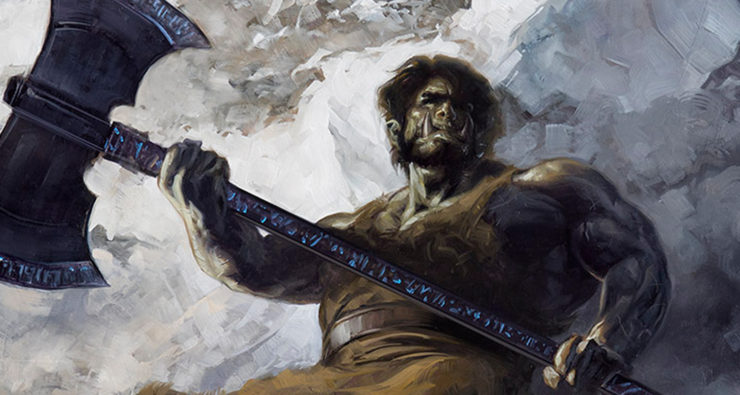
I’m a big fan of Orconomics by Zachary Pike.
David Weber’s Oath of Swords and sequels follows the adventures of (essentially) a half-orc paladin. Pretty heavily D&D-influenced, but quite a lot of interesting questions and takes on things.
@2: The earlier books are a romp. (Haven’t read the later ones.) But, those who haven’t read them take note, they do delve into some deep subjects, as for example: If you actually had the D&D ability of entering a super-powered berserker rage, wouldn’t people find you terrifying all the time–like a walking bomb? The adult males of Bahzell’s people all have that ability, whether they want it or not. It has affected their culture, and also their treatment by the other branches of humankind, in profound ways.
Elliott Kay’s _Wandering Monsters_ series has an entire party made up of nonhumans, and gleefully subverts every trope Kay can find an excuse to mock and/or abuse. Even the token party outsider is…a female human of noble birth.
In successful fantasy, monsters, if done right, are often a mirror to the reader and their time. That’s why vampires have remained so popular and have changed so much.
Surprised they didn’t bring up “Monster of Elendhaven.”
Terry Pratchett. The hero of “Unseen Academicals” is an orc.
Please, please can we have more Slud??!!!!??
Ooh, I just got Unnatural Magic in my ludicrous stack of holds from the library (I’m trying to channel my book binges into the cheaper outlet). This moved it higher up the stack.
T Kingfisher has a lovely little novella from the POV of the standard fantasy trash mobs, Nine Goblins. Also notable for featuring an elven veterinarian!
Wells’s Raksura series, of course. Raksura can be pretty dangerous when they feel like it, but humanoids’ reaction to them is even stronger because of their unfortunate resemblance to an even *more* dangerous species of humanoid-eaters. They both look about equally monstrous to people who aren’t sufficiently familiar with them.
The Strange Case of the Alchemist’s Daughter and its sequels are all over the meaning of monstrousness and what it really means.
The concept of “monstrous” can be a little more difficult to define in some settings, but I’d argue that both the Murderbot series and the Ancillary series qualify, in terms of how people react to the protagonists (when they’re not passing as human, or not succeeding at passing).
Is the title character of The Goblin Emperor monstrous? Depends very much on who you ask (which is kind of an overarching theme in many books mentioned here).
I am not sure if fully fits but I remember “Ogre, Ogre” by Piers Anthony. The main character being a half ogre.
Orcs Stan Nicholls.
Jig from Him C Hines Goblin Quest series. little nearsighted goblin :)
Jack Vance’s The Eyes of the Overworld (1966) also fits this theme. The anti-hero Cugel encounters two different races. One group is beautiful and the other is hideously. Cugel assumes that the nice looking ones will be nice people. He’s wrong. The frightening looking group turns out to be crude but kind.
Probably the popularity of this cliche could be blamed on Tolkien. However, ever since I learned that Tolkien’s orcs came from elves that had been tortured by Morgoth I’ve wondered what would happen if you took an orc child and treated it kindly. Would it regain its “elfness”? Is it more a result of environment than race in Middle-Earth? In any case it is a cliche that needs to die.
Feature request: It would be nice when posting book lists like this, if there was a goodreads widget for adding the titles to my “I want to read” list. It’s tedious to have to jump back and forth between websites to search for each book and add it to my backlog.
“The Grey Bastards” by Jonathan French has bands of half-orcs acting like the Rangers in MiddleEarth, patroling and defending the borderlands between wastelands and the “civilized world”
The sad thing is how few people know that this trend actually started with Dance of the Goblins by Jaq D. Hawkins (originally published 2005). Still the best of the goblin/orc characterisations in my opinion and the only one to explain *why* humans and goblins are always at odds.
@2 and @13 Seconded!
One of my other favorites is the William Bradshaw series by Arthur Daigle. Will is a regular guy from earth who’s transported to the “Other Place” (reasonably standard fantasy world) and forced to be king of the goblins. He starts out appalled by them and their kingdom, but eventually starts to appreciate their particular brand of insanity, while they, in turn, start realizing they don’t have to be the downtrodden, perpetually losing vermin everyone else thinks they are. Also by the same author and set in the same world is Goblin Stories, with another group of the goblins as protagonists.
Kage Baker’s The House of Stag. The main character is a half-demon. Also by Tchaikovsky, Redemption’s Blade. The main character is human but some of her companions are not.
@17 / Pam – how do you define “trend”? Many of the books being mentioned predate 2005…
Also, what’s your criteria for judging the “why” for the racial conflicts between Orcs and Humans? Tolkien’s Orcs were forged by evil incarnate (depending on what point of his constant revisions, he wavered between from scratch, from animals, or from elves) into weapons aimed at everyone who didn’t bow before him. That seems pretty solid motivation to me…
@14, which one is the cliche that needs to die? the “ugly is actually kind”, or “ugly is nasty”?
‘Cause the former is gaining traction and is becoming a whole new trope, in my opinion..